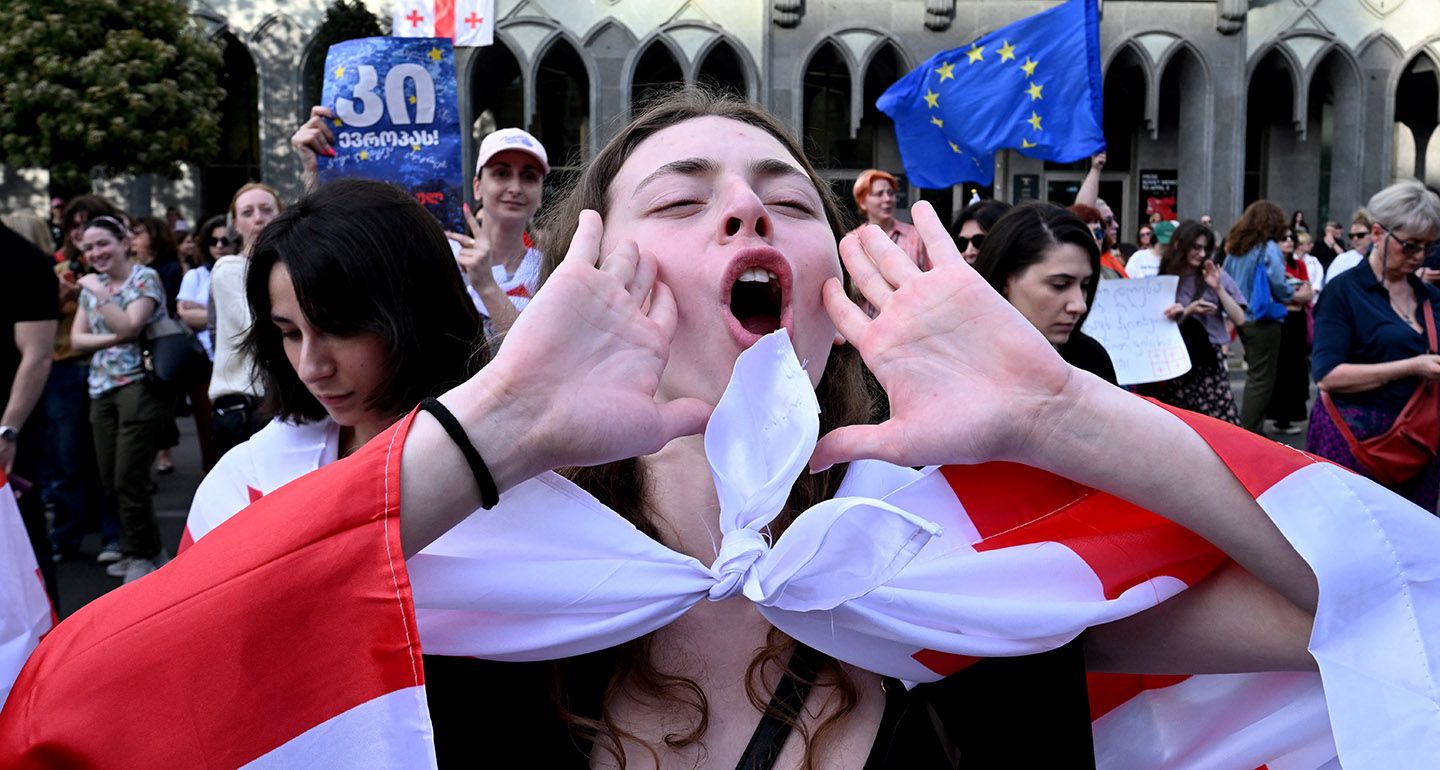The story of a has-been politician apparently caught red-handed is intersecting with the larger forces at work in the Ukrainian parliament.
Konstantin Skorkin
{
"authors": [
"Alexander Atasuntsev"
],
"type": "commentary",
"blog": "Carnegie Politika",
"centerAffiliationAll": "",
"centers": [
"Carnegie Endowment for International Peace",
"Carnegie Russia Eurasia Center"
],
"collections": [
"Aso Tavitian Initiative"
],
"englishNewsletterAll": "",
"nonEnglishNewsletterAll": "",
"primaryCenter": "Carnegie Russia Eurasia Center",
"programAffiliation": "",
"programs": [],
"projects": [],
"regions": [
"Georgia"
],
"topics": [
"Domestic Politics",
"Civil Society",
"Political Reform"
]
}
The Georgian Dream party has effectively threatened that if the opposition loses the upcoming election, it may lose legal means of fighting for power in the future. In other words, the authorities themselves are putting the opposition in a situation where street battles are the key to its survival.
Georgia’s upcoming parliamentary elections in October promise to be historic, and the closer the vote gets, the more unrealistic the election promises of the ruling party are becoming. Georgian Dream, which has been in power for twelve years now, is promising not only to join the European Union, but also to return Georgia’s breakaway regions and even outlaw the opposition.
Such megalomaniacal rhetoric shows that the party is far from confident of victory in the election, and is prepared to go to great lengths to avoid losing. But by threatening to strip the opposition of legal ways of fighting for power, Georgian Dream is itself paving the way for revolution.
The party has never been known for its moderate campaigning, but the current campaign leaves all previous ones in the shade. In mid-August, Georgian Dream announced that if it wins a constitutional majority of seats in parliament (113 or more out of the 150 total seats), it will ban the “collective National Movement”—a term it has come up with to refer to all pro-Western opposition groups associated with the main opposition party, the United National Movement (UNM).
Georgian Prime Minister Irakli Kobakhidze subsequently went even further, clarifying that the ban would apply not just to former president Mikheil Saakashvili’s UNM, but effectively to all the major opposition parties in the country, including Ahali and Lelo, which are not part of the UNM coalition. That would leave Georgia with a one-party parliament.
The founder of Georgian Dream, billionaire Bidzina Ivanishvili, who has been touring the country for weeks ahead of the election, has also used his speeches to criticize previous Georgian authorities and threaten reprisals. He never tires of criticizing the UNM, accusing it of “provoking” Georgia’s brief war with Russia in August 2008 and of trying to drag Georgia into a new conflict with Russia. He calls the opposition “the party of global war” and “fascists,” and has promised “Nuremberg trials” for them.
Combined with these threats of repression are vague promises to return the breakaway regions of Abkhazia and South Ossetia to Georgia. The ruling party has said that the nation must be prepared to change the constitution in the event of the peaceful restoration of its territorial integrity. In other words, Georgian Dream would accept the creation of a federation—or even a confederation—with Abkhazia and South Ossetia as autonomous parts of it. Speaking in the city of Gori in mid-September, Ivanishvili even asserted that after the elections, “we will definitely find it in us” to apologize to South Ossetia for the 2008 war, which he blamed on outside forces and Georgia’s then government.
Such rhetoric is needed not only to show voters that the government is serious about reconciling with the breakaway republics, but also to create the impression that Georgian Dream already has some kind of secret agreement with Moscow (which props up South Ossetia and Abkhazia) that will come into play immediately after the elections. That suggestion, however, appears to be nothing more than a bluff.
There are no signs in Abkhazia or South Ossetia of any preparations for possible reintegration: no new humanitarian programs, no lifting of trade restrictions, and no easing of border regulations. Even Ivanishvili himself has said outright that “admitting one’s own mistakes” will only be “the beginning of a path that will give rise to a desire to restore trust between people living on both sides of the dividing line.”
Nor is there any guarantee that it is within Moscow’s power to make the breakaway republics agree to return to Georgia. It’s true that Abkhazia and South Ossetia are heavily dependent on Russia and subordinate to it in many ways—but not when it comes to their independence.
This is abundantly clear from examples such as the debate that regularly flares up over Russia’s attempts to get the Abkhaz authorities to allow Russians to buy real estate in the republic. A bill to that effect was put before parliament in early 2023, but sparked major protests in Abkhaz society. It was eventually withdrawn by legislators in the summer of 2024.
Moscow was clearly displeased by that. According to the leaked minutes of a meeting between Abkhazian President Aslan Bzhania and Russian Deputy Chief of Staff Dmitry Kozak, Moscow asked the Abkhazian authorities to provide it with a list of parliamentary deputies and opposition leaders acting against Russia’s interests in order to strip them of their Russian citizenship (most residents of Abkhazia have Russian passports as well as Abkhazian ones, since the latter are not recognized internationally). That proposal only fanned the flames of the Abkhazians’ anger, and there are growing demands in the republic for the president to resign.
Georgian Dream’s other pre-election narratives, such as its promises to continue along the path of EU membership, are hardly less problematic. Despite a recent nosedive in relations with both Brussels and Washington, Ivanishvili is confident that this is only a temporary spat, and that as soon as the war in Ukraine ends, all the differences between Tbilisi and the West will be “a thing of the past.”
This is a deliberate policy by Georgian Dream, which since 2022 has built its popularity on various “unknowns,” from the fear of another war on Georgian territory to nebulous hopes for the country’s reunification. Still, such an overt threat of political repression as vowing to outlaw the opposition is an unexpected move that completely changes the significance of the upcoming elections.
Although the party stipulated that it would only ban the opposition if it receives a constitutional majority, which, judging by the polls, is unlikely to happen, the increased stakes for all participants are still dizzying. What hangs in the balance now is not just the distribution of power in parliament for the next four years, but essentially the very survival of the Georgian opposition.
The ruling party’s previous actions have only heightened concerns over the future of democracy in Georgia. It was under the current parliament that former president Saakashvili, the founder and face of the UNM, was arrested and sent to prison. The same parliament recently passed a controversial“foreign agents”law that makes the work of civil society institutions far more difficult.
Now Georgian Dream is effectively declaring that if the opposition loses the upcoming election, it may lose its legal means of fighting for power in the future. And unlike the hints about the possible return of the breakaway regions, there is no reason to believe that this is a bluff. In other words, the authorities themselves are putting the opposition in a situation where street battles will be key to its survival.
Carnegie does not take institutional positions on public policy issues; the views represented herein are those of the author(s) and do not necessarily reflect the views of Carnegie, its staff, or its trustees.
The story of a has-been politician apparently caught red-handed is intersecting with the larger forces at work in the Ukrainian parliament.

Konstantin Skorkin
For years, the Russian government has promoted “sovereign” digital services as an alternative to Western ones and introduced more and more online restrictions “for security purposes.” In practice, these homegrown solutions leave people vulnerable to data leaks and fraud.

Maria Kolomychenko
It’s one thing to export Russian helicopters to Iran to fight the insurgency, and it’s easy to imagine Moscow becoming a haven for fleeing Iranian leaders. But it’s very difficult to imagine Russian troops defending the Iranian regime on the ground.

Nikita Smagin
While appointing Kyrylo Budanov will help shore up Zelensky’s political authority and balance the president’s inner circle, the spy chief’s political ambitions mean he could be a threat.

Konstantin Skorkin
While signaling internationally that it wants peace, the Azerbaijani regime continues to promote anti-Armenian sentiment at home to mobilize domestic support.

Bashir Kitachaev